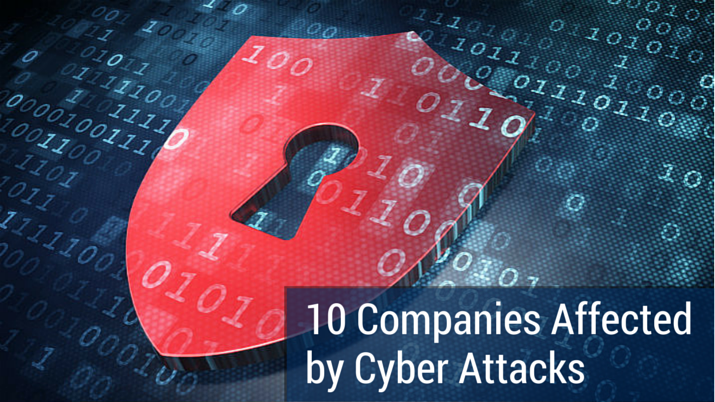10 Companies Affected by Cyber Attacks

Last Updated February 10, 2015
Millions of American consumers have become victims of cyber attacks, simply by shopping at their favorite store, shipping a package or doing their online banking. Data breaches are increasing in frequency, and more people are seeing their credit card information used maliciously, their identities stolen or their bank accounts drained.
Cyber Attacks on U.S. Companies
As cyber thieves become more sophisticated, it seems no one is safe from attack. Here are 10 U.S. companies that experienced recent security breaches, which compromised their customers’ sensitive information:
- Target – In December 2013, Target announced a massive breach of its in-store payment system, where hackers stole some 40 million credit and debit card numbers. In January, the company confirmed that 70 million customers also had their names, addresses, emails and telephone numbers stolen. The data breach led to the May resignation of Target’s CEO.
- Yahoo! – The email giant confirmed in January that approximately 273 million users’ passwords and usernames were exposed to cyber attackers.
- AT&T – AT&T experienced an internal security breach in April 2014. Three workers at one of the company’s service providers accessed customers’ personal information, including social security numbers and dates of birth.
- eBay – In February and March, eBay was the victim of cyber attacks that gave hackers access to the contact and log-in information of approximately 233 million customers.
- UPS – Customer information, including financial data, was compromised from more than 60 UPS stores between January and August of 2014. The number of affected transactions exceeded 100,000 before the company contained the incident, believed to have been caused by malware.
- Home Depot – In April and May, cyber criminals accessed Home Depot’s network to deploy Backoff malware on self-checkout systems, and steal credit and debit card information from approximately 56 million customers. Roughly 53 million email addresses were also stolen. The malware was designed to evade detection by anti-virus software. Home Depot has since enhanced its cybersecurity practices.
- Google – In September 2014, approximately 5 million usernames and passwords of Gmail account holders were compromised and leaked on a Russian forum site. Of these, about 100,000 were legitimate, current and correct username-password combinations.
- Apple – Hackers accessed Apple iCloud, the company’s online data storage system, and posted private photos of celebrities online. Apple stated that individual accounts were accessed through maneuvers that guessed usernames, passwords and security questions – and that Apple’s systems were not compromised.
- JPMorgan Chase – The financial firm was attacked in June 2014, but didn’t discover it until August. Russian hackers, who may have ties to the Russian government, gained access to servers and stole contact information from 76 million households and 7 million businesses. Current and former customers who used Chase.com or JPMorgan.com via web or mobile device were affected.
- Dairy Queen International – Customers at nearly 400 Dairy Queen and Orange Julius stores had their credit and debit card information compromised in October 2014. Payment systems were infected with Backoff malware through a third-party vendor’s stolen account credentials.
The Need for Cybersecurity
These examples are just ten of the thousands of cyber attacks that occur each year in the United States and around the world, affecting millions of customers. Companies must remain at the forefront of cybersecurity, continue to share information about threats and attacks, and employ diligence in the fight against cyber crime.





